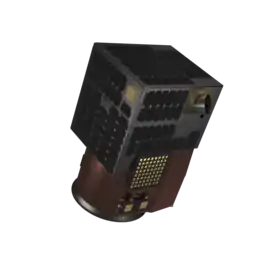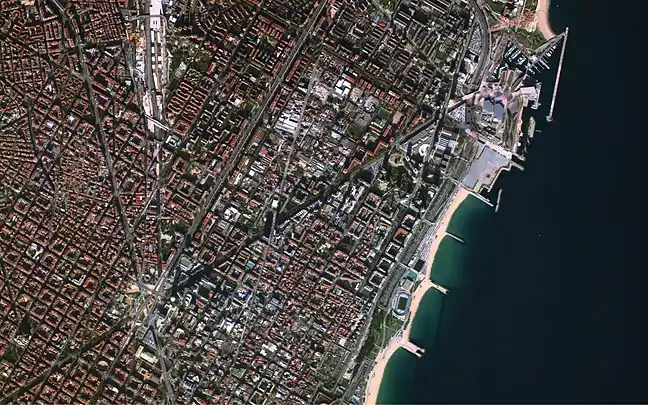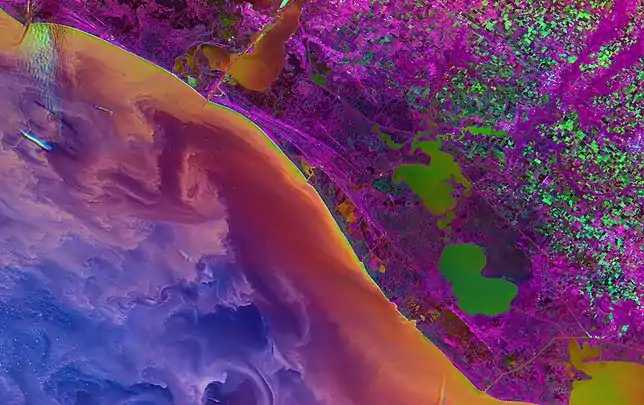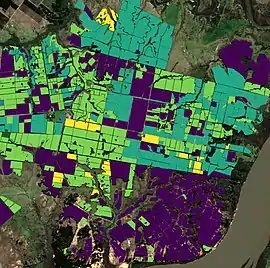Satellogic
Satellogic is an Argentine company specialized in Earth-observation satellites, founded in 2010 by Emiliano Kargieman and Gerardo Richarte. Satellogic made Argentina's first two nanosatelites, CubeBug-1 (nickname El Capitán Beto, COSPAR 2013-018D, launched 26 April 2013 on a Long March 2D launch vehicle) and CubeBug-2 (nickname Manolito, also known as LUSAT-OSCAR 74 or LO 74, COSPAR 2013-066AA, launched 21 November 2013 on a Dnepr launch vehicle).[1] Their third satellite, BugSat 1 (nickname Tita), launched in June 2014.[2] Both the CubeBug-1 and CubeBug-2 as well as the BugSat 1 satellite served as technology tests and demonstrations for the ÑuSat satellites. They also had amateur radio payloads.
| Type | Private |
|---|---|
| Earth observation satellite | |
| Industry |
|
| Founded | 2010 |
| Founders |
|
| Headquarters | |
Number of locations | 8 offices (Argentina, Uruguay, Spain, Israel, China, USA) |
Number of employees | 180 |
| Website | www |
The CubeBug project was sponsored by Argentinian Ministry of Science, Technology and Productive Innovation.
Satellogic began launching their Aleph-1 constellation of ÑuSat satellites in May 2016.[3]
On 19 December 2019, Satellogic announced they have received US$50 million in funding in the latest funding round.[4]
History
In the summer of 2010, after spending some time at the Ames Research Center in Mountain View, California, Emiliano Kargieman started developing the concepts that would become Satellogic.[5] He realized there was a great opportunity: to bring to the satellite services industry many of the lessons learned during the last two decades of working with Information Technology, and build a platform that provides spatial information services, without major investments in infrastructure. Together with his friend and colleague, Gerardo Richarte,[6] they started Satellogic.
Since 2010, the company has grown from a small start-up to a multinational company that has customers around the globe.[7][8]
Satellogic is backed by strategic and financial supporters including Tencent (China), the Inter-American Development Bank (U.S.), Pitanga (Brazil), Valor Capital Group (U.S.), and CrunchFund (U.S.), among others.[9]
Technology

Satellogic is building a 90-satellite constellation as a scalable Earth observation platform with the ability to weekly remap the entire planet at high resolution to provide affordable geospatial insights for daily decision making.[10][11]
Satellogic created a small, light, and inexpensive system that can be produced at scale. Each commercial satellite carries two payloads – one for high resolution multispectral imaging and another one for a hyperspectral camera of 30 m GSD and 150 km swath (at a 470 km altitude).[12]
Satellite specifications
Satellogic's satellites are built to the following specifications:[13]
| Size: | 51 x 57 x 82 cm |
| Dry Mass: | 38.5 kg |
| Wet Mass: | 41.5 kg |
| Development Cycle: | 3 months |
| Design Life: | 3 years |
Products and services
Dedicated satellite constellations
Satellogic's markets "Dedicated Satellite Constellations" (DSC) as an opportunity for customers to develop a national geospatial imaging program at unmatched frequency, resolution and cost. This program is aimed at municipal, state and national governments eager to gain exclusive control of a fleet of satellites over an area of interest.[14] It can be used to support key decisions, to manage policy impact, to measure investment and socio-economic progress and to serve as an open environment to foster collaboration, data and information sharing.[15]
DSC's satellites are registered and flagged by the operating entity. With complete control of the satellites over the designated area of interest, the operator will directly task the satellite from its own ground station, allowing frequent remapping and the ability to revisit specific points of interest several times per day. Total control of imagery download and private cloud archiving guarantee prompt and secure data management by an operator's own team.[16]
In 2019. Satellogic signed its first agreement to deliver a dedicated satellite constellation for exclusive geospatial analytics in Henan Province, China.[17]
DSC has been nominated for Via Satellite's "2019 Satellite Technology of the Year" Award.[18]
Data services
Satellogic offers 1-meter resolution multispectral imaging and 30-meter resolution hyperspectral satellite imagery.[19]
 Barcelona, Spain - Multispectral Image
Barcelona, Spain - Multispectral Image Louisiana, United States - Hyperspectral Camera
Louisiana, United States - Hyperspectral Camera
Geospatial analytics

Satellogic's data science and AI team convert images into layers [21] available as data-services in its online platform, including object identification, classification, semantic change detection and predictive models within a broad range of industries including agriculture, forestry, energy, finance and insurance, as well as applications for the civilian area of governments, such as cartography, environmental monitoring and critical infrastructure, among others.[22]
Offices
Satellogic's R&D facilities are located in Buenos Aires and Córdoba, Argentina. The AIT facility is located in Montevideo, Uruguay. The data-technology center in Barcelona, Spain; a product-development center in Tel Aviv, Israel; a finance office in Charlotte, United States, and there are business development centers in Miami, United States, and Beijing, China.[23]
Satellite launches
As of November 2020, Satellogic has launched 21 satellites [24] from China and Russia and French Guiana. While the first three spacecraft were early prototypes, the latest eight satellites correspond to four consecutive iterations and incremental versions of Satellogic's ÑuSat design (Mark I to Mark IV).
| Satellite | Launch Vehicle | Launch Base Location | Launch Date |
|---|---|---|---|
| CubeBug-1, Capitán Beto | Long March 2D | Jiuquan, China | 26 April 2013 |
| CubeBug-2, Manolito | Dnepr | Yasny, Rusia | 21 November 2013 |
| BugSat-1, Tita | Dnepr | Yasny, Rusia | 19 June 2014 |
| ÑuSat-1, Fresco | Long March 4B | Taiyuan, China | 30 May 2016 |
| ÑuSat-3, Milanesat | Long March 4B | Jiuquan, China | 15 June 2017 |
| ÑuSat-4, Ada* | Long March 2D | Jiuquan, China | 2 February 2018 |
| ÑuSat-7, Sophie* | Long March 2D | Taiyuan, China | 15 January 2020 |
| ÑuSat-6, Hypatia* | Vega | Kourou, French Guiana | 2 September 2020 |
| ÑuSat-9, Alice Ball | Long March 6 | Taiyuan, China | 6 November 2020 |
* Since 2018, Satellogic has a tradition of naming their spacecraft after important women scientists.[25]
- Ada and Maryam were named for mathematicians Ada Lovelace and Maryam Mirzakhani.
- Sophie and Marie were named in honor of Sophie Germain, the mathematician and physicist, and Marie Curie, the physicist and chemist.
- Hypatia was named after the philosopher, astronomer, and mathematician who lived in Alexandria and was a symbol of learning and science.
On 19 January 2021, it was announced that SpaceX would become their preferred rideshare vendor, the first due in June 2021.[26]
Mission patches

See also
References
- "Satellogic". satellogic.com. Retrieved 4 February 2016.
- Henry, Caleb (29 December 2014). "Satellogic Finalizes 16-Satellite Earth Observation Constellation". satellitetoday.com. Satellite Today. Retrieved 29 March 2018.
- Jones, Andrew. "China launches seismo-electromagnetic probe along with ESA, Danish and commercial CubeSats". GB Times. Retrieved 2 February 2018.
- https://spacenews.com/satellogic-raises-50-million-to-build-out-imaging-constellation/
- Politi, Daniel (19 September 2016). "Six men and women shaping how the world views Argentina". ft.com. Retrieved 5 May 2020.
- "Gerardo Richarte BIO". Retrieved 10 March 2019.
- "Satellogic Signs Agreement to Deliver Dedicated Satellite Constellation for Exclusive Geospatial Analytics in Henan Province, China". Parabolic Arc. Retrieved 6 May 2020.
- Atkins, Jacob (22 February 2019). "Satellogic announces new leadership plus new satellites". contxto.com. Retrieved 6 May 2020.
- "Satellogic confirms US$50M financing round from Tencent, Pitanga Fund, IDB Lab; 2 satellites to launch in January". spaceintelreport.com. 19 December 2019. Retrieved 5 May 2020.
- "CGWIC Signs Agreement to Launch Satellogic Earth Observation Constellation of 90 Satellites". Retrieved 15 January 2019.
- "This Startup Wants to Check the Ripeness of Coffee Beans From Space". Retrieved 15 January 2019.
- Chaturvedi, Aditya (1 March 2019). "Satellogic plans to remap the planet at one meter resolution each week". geospatialworld.net. Retrieved 5 May 2020.
- Nichols, Greg. "Space firm to launch 90 satellites for constellation blanketing Earth". zdnet.com. Retrieved 5 May 2020.
- "Satellogic". satellogic.com. Retrieved 5 May 2020.
- "SatMagazine". satmagazine.com. Retrieved 5 May 2020.
- "Satellogic Signs Agreement to Deliver Dedicated Satellite Constellation for Exclusive Geospatial Analytics in Henan Province, China". Parabolic Arc. Retrieved 5 May 2020.
- "Argentine start-up seals rare China space imaging deal". ft.com. Retrieved 5 May 2020.
- "2019 Nominees for Satellite Technology of the Year". Satellite Today. March 2020.
- "Satellogic will launch two new Earth observation satellites as it expands operations". techcrunch.com. Retrieved 5 May 2020.
- "Satellogic". satellogic.com. Retrieved 5 May 2020.
- "A Snapshot of Imagery in Agriculture". agriculture.com. 22 November 2019. Retrieved 5 May 2020.
- "This Startup Wants to Check the Ripeness of Coffee Beans From Space". bloomberg.com. 15 January 2019. Retrieved 5 May 2020.
- "Satnews Publishers: Daily Satellite News". satnews.com. Retrieved 5 May 2020.
- Takken, Remco (16 January 2020). "Successful launch of Satellogic's "Marie and Sophie" satellites". geospatialworld.net. Retrieved 5 May 2020.
- "Satellogic to Launch Two NewSat Mark IV Spacecraft". businesswire.com. 7 January 2020. Retrieved 6 May 2020.
- "Satellogic and SpaceX Announce Multiple Launch Agreement". businesswire. 19 January 2021. Retrieved 21 January 2021.